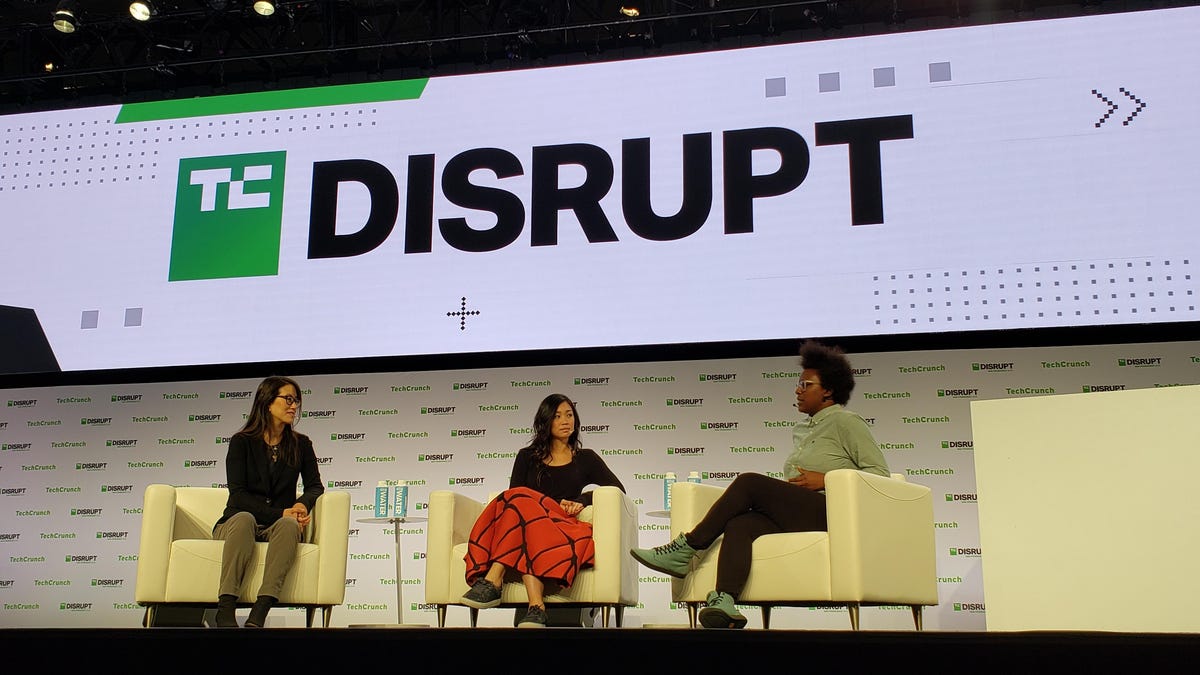Ellen Pao, Tracy Chou say they worry about tech's negative impact, lack of values
Companies need to be more concerned about their effect on people, the diversity advocates say.

Ellen Pao and Tracy Chou discuss ethics in tech at TechCrunch Disrupt in San Francisco.
The tech industry needs to be more concerned about its impact on society, Ellen Pao and Tracy Chou told the audience at a tech conference Friday.
"There's this failure of all these companies to take into account the consequences of their products, of their actions, of their lack of values," Pao said at TechCrunch Disrupt in San Francisco. She said it appears that people who run companies are only focused on generating wealth, rather than what's happening to the people around them.
Chou echoed those concerns.
"For a long time, [tech] was just a small part of society," she said. "And now tech is very dominant and needs to be much more accountable to what it's doing."
Pao said one of the most prominent examples of a lack of ethics in tech is Juul, which has been accused of luring underage customers to use its products. Last year, the Food and Drug Administration requested information from the company about its marketing practices and its appeal to teens. And in August, the Federal Trade Commission said that it's looking into Juul's marketing practices. Juul didn't immediately respond to a request for comment.
She also criticized Twitter for allowing President Donald Trump to remain on the platform.
Ellen Pao says litigation could be the wake-up call some companies need to be more ethical.
"It's a question of values and I think it's a question of ethics to create these exceptions because you want to drive this growth ... without thinking about the long-term direction of where your platform is going," she said.
A Twitter representative declined to comment, but pointed to a blog post from last year that says "Blocking a world leader from Twitter or removing their controversial tweets would hide important information people should be able to see and debate."
Litigation could be the wake-up call some companies need to be more ethical, Pao said. Chou added that recruiting is also critical to change. If enough employees or candidates take a stance and say they won't work for a company that does unethical things, companies will be more likely to act and respond.
The women also addressed diversity and inclusion efforts in tech -- an industry that's more than two-thirds male and 69% white, according to the Kapor Center. Women in Silicon Valley often have to contend with major biases.
It's an issue with which Pao and Chou are quite familiar. Pao became a major force for fighting sexism in Silicon Valley after losing a gender discrimination case against Kleiner Perkins in 2015. In 2016, the former Reddit CEO and seven other female tech leaders joined forces with the nonprofit initiative Project Include, which aims to help make companies more diverse and inclusive.
In 2013, Chou, who was then a software engineer at Pinterest, wrote a Medium post asking for data on how many women held technical roles in the industry. That move helped catalyze the practice of tech companies releasing diversity reports. She's now the CEO of Block Party, which is working to prevent online abuse and harassment.
Pao said that in the past few years people in the industry have come to realize that 45-minute unconscious bias training isn't as effective as having conversations and sharing stories about people's experiences.
"This idea that you can change somebody's values easily through short interactions, that's really hard," Pao said. "Everybody's realized that actually does not work at all. You need these ongoing trainings, you need ongoing interaction and you need to measure and hold people accountable."
Originally published Oct. 4 at 12:13 p.m. PT.
Update, 3:19 p.m. PT: Adds Twitter's response.

